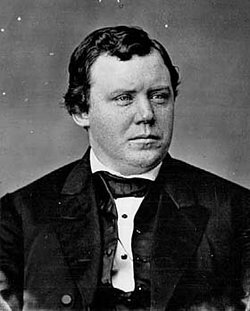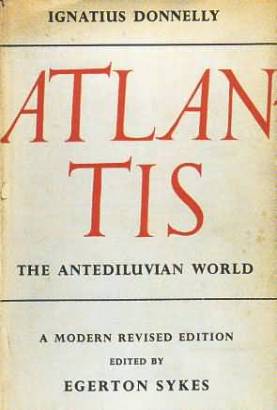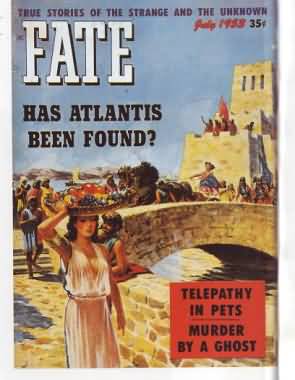

Scanned at sacred-texts, November 2000. J. B. Hare, redactor. This text is in the public domain. This file may be used for any non-commercial purpose, provided this notice of attribution is left intact.
The world has made such comet-like advance
Lately on science, we may almost hope,
Before we die of sheer decay, to learn
Something about our infancy; when lived
That great, original, broad-eyed, sunken race,
Whose knowledge, like the sea-sustaining rocks,
Hath formed the base of this world's fluctuous lore
FESTUS .
The Purpose Of The Book
Plato's History Of Atlantis
The Probabilities Of Plato's Story
Was Such A Catastrophe Possible?
The Testimony Of The Sea
The Testimony Of Flora And Fauna
The Destruction Described In Legends
The Deluge Of The Bible
The Deluge Of The Chaldeans
The Deluge Legends Of Other Nations
The Deluge Legends Of America
Some Consideration Of The Legends
Civilization An Inheritance
The Indentity Of The Old World And The New
American Evidences Of Intercourse With Europe Or Atlantis
Corrobating Circumstances
The Question Of Complexion
Genesis Contains A History Of Atlantis
The Origin Of Our Alphabet
The Bronze Age In Europe
Artifical Deformation Of The Skull
Traditions Of Atlantis
Kings OF Atlantis Become Greek Gods
Phœnicians Gods Also Kings Of Atlantit
The God Odin, Woden Or Wotan
The Pyramid, The Cross And The Garden Of Eden
Gold And Silver: The Sacred Metals Of Atlantis
Central American And Mexican Colonies
The Egyptian Colony
Colonies Of The Mississippi Valley
The Iberian Colonies
The Peruvian Colony
The African Colonies
The Irish Colonies From Atlantis
The Oldest Son Of Noah
Antiquity Of Some Great Inventions
The Aryan Colonies
Atlantis Reconstructed
Bulfinch's Mythology
Full Site Menu
My Homepage
Just sign it
Religion Menu
My Forum
From Wikipedia, the free encyclopedia.



Ignatius Donnelly (also spelled Ignatius Donelly) (November 3, 1831 - January 1, 1901) was an American congressman, populist, and writer, who is noted primarily for his theories on the history of Atlantis and Shakespearean authorship.
He was born in Philadelphia, Pennsylvania, studied law, and was admitted to the bar in 1852. In 1855, he married Katherine McCaffrey (with whom he was to father three children). He moved to Minnesota in 1857 where he settled in Dakota County. Together with several partners, Donnelly founded a utopian community called Nininger City. However, the Crash of 1857 doomed that attempt at a cooperative farm and community, and left Donnelly deeply in debt.
Donnelly then entered politics and was Lieutenant Governor of Minnesota from 1859-1863. He was Republican Congressman from Minnesota in the 38th, 39th and 40th Congresses (1863-1868), and state Senator from 1874-1878. As a congressman, Donnelly advocated extending the powers of the Freedmen's Bureau to provide education to the freedmen, so that they could protect themselves once the bureau was withdrawn. Donnelly was also an early supporter of women's suffrage.
After leaving the Minnesota State Senate in 1878, Donnelly returned to the practice of law and writing. In 1882, he published Atlantis: The Antediluvian World, his best known work, detailing his theories concerning the mythical lost continent of Atlantis. He made several other runs for public office during the 1880s. He made a losing run for Congress (this time as a Democrat) in 1884, and in 1887 he successfully ran for the Minnesota State Legislature as an Independent. During this period, he was also an organizer of the Minnesota Farmers' Alliance.
Donnelly undertook a final foray into politics in 1892. He was nominated for Vice-President of the United States by the People's Party (also known as the Populist Party). The People's Party rose out of the national Farmers' Alliance movment, and stood on a platform that called for unlimited coinage of silver, abolition of national banks, a graduated income tax, direct election of Senators, civil service reform, and eight hour work day. That year, Donnelly also ran for governor of Minnesota, and was defeated.
His wife Katherine died in 1894, and in 1898, he remarried, wedding his secretary, Marion Hanson. He died on January 1, 1901 in Minneapolis, Minnesota, and is buried in Calvary Cemetery, St. Paul, Minnesota. His personal papers are archived at the Minnesota Historical Society.
His books include:
Atlantis: The Antediluvian World (1882), in which he attempted to establish that all known ancient civilizations were descended from its high-Neolithic culture.
Ragnarok, the Age of Fire and Gravel (1883), in which he proposed that a comet hit the earth in prehistoric times and destroyed a high civilization.
The Shakespeare Myth (1887)
Essay on the Sonnets of Shakespeare
The Great Cryptogram: Francis Bacon's Cipher in Shakespeare's Plays (1888), in which he maintained he had discovered codes in the works of Shakespeare which indicated that their true author was Francis Bacon.
Caeser's Column (1890), a science fiction novel set in 1988 about a worker revolt against a global oligarchy. (Published under the pseudonym of Edmund Boisgilbert.)
Doctor Huguet: A Novel (1891) (Published under the pseudonym of Edmund Boisgilbert.)
The Golden Bottle or the Story of Ephraim Benezet of Kansas (1892) The American People's Money (1895)
The Cipher in the Plays, and on the Tombstone (1899)